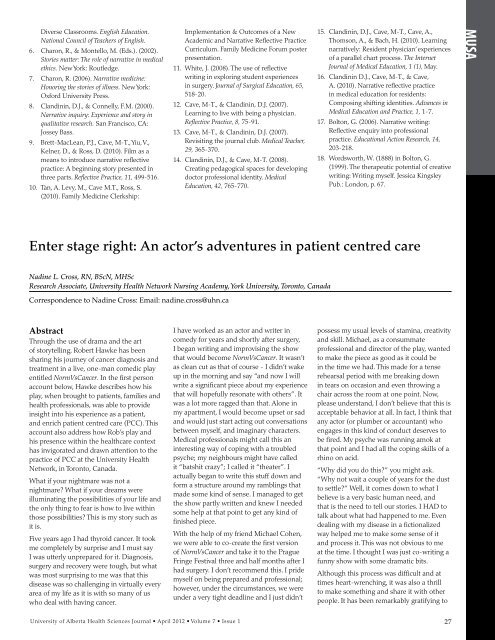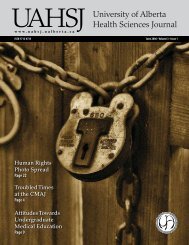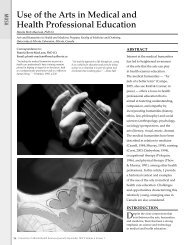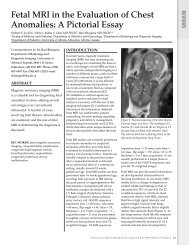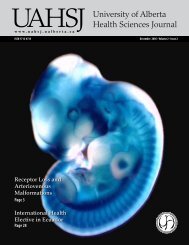MUSAphysician learner. Following full-lengthfilm screenings, a panel <strong>of</strong> faculty membersmodeled narrative reflection by sharingtheir reflections on the visual narrative withthe students. Two days later, the studentsshared their written narrative reflectionson the film in facilitated small groups. Aseries <strong>of</strong> wondering questions, arising fromthe visual narrative and based around thethree dimensions <strong>of</strong> narrative inquiry (place,temporality, sociality) assisted in the process<strong>of</strong> narrative reflective practice. Studentfeedback helped to inform the ongoingevolution <strong>of</strong> the Narrative Reflective Practice(NRP) module in our first year PatientCentred Care course. 9In second year, Gilbert Scholars, physicianswho work with second year students, weretrained by Jean, Marie, and Alan Thomsonto facilitate narrative reflective practicearound listening to and inquiring into theirexperiences <strong>of</strong> “the patient’s story.” In theGilbert Scholars’ course, students learn howto take a medical history, and learn how toperform a physical exam. A comparativeresearch study was undertaken that involvedhaving some small groups within the classmeet for a second time with a patient and,in conversation, explore the patients’ stories<strong>of</strong> their illness experience. Each studentthen wrote, and shared with peers in theirsmall group, a narrative reflection on thepatients’ stories <strong>of</strong> their illness. The storiesthe second year students wrote showed howmuch they learned from attending closelyto the stories that patients told <strong>of</strong> whatwas happening to them. We are hopingto repeat this study in the near future inorder to establish conclusively if there is adifference in history-taking competenciesbetween those students who participate inthe narrative reflective practice interventionand those who do not. In the meantime, werecently introduced additional sessions <strong>of</strong>our film-based NRP module into the secondyear Patient Centred Care course.In third year, when students begin theirclinical practice, we found that narrativereflective practice begins to impact thelearner physicians’ pr<strong>of</strong>essional identityformation. 10 Students in family medicineand surgery clerkship rotations nowparticipate in narrative reflective practiceactivities. In surgery, clerks write anarrative reflection on a surgery clerkshipexperience. 11 In family medicine, studentclerks write parallel charts <strong>of</strong> a clinicalencounter in practice. 10 As described by RitaCharon, the parallel chart is the place wherethe physician learner writes those thingsthat don’t belong in the chart “but needto be written somewhere”. 7 This exerciseaffords the learner opportunities for bothreflection and reflexive thinking aroundtheir responses to the clinical encounter.In their family medicine rotation, studentsshare their written reflections in facilitatedsmall groups, using the three dimensionalnarrative inquiry dimensions to inquireinto their stories <strong>of</strong> experiences as writtenin their parallel charts. In addition, someresidents have been involved in facilitatingthe small groups we introduced in ourfirst and second year Patient Centred Carecourse.Pilot studies have been completed in familymedicine and internal medicine residencyprograms. 12,13,14,15,16 At this point, NRP hasnow been introduced in family medicine andsurgery residency programs, and recently aNarrative Reflective Practice journal club hasbegun as a means <strong>of</strong> supporting continuingpr<strong>of</strong>essional learning for academic andclinical faculty. In addition to the NarrativeReflective Practice initiatives describedabove, we are aware that preceptors whoteach and guide learners in undergraduateand postgraduate programs are exploringvarious approaches to reflection, some <strong>of</strong>it narrative reflective practice. This newinitiative marks the achievement <strong>of</strong> the goal<strong>of</strong> our original developmental curriculumplan—to become involved in all stages <strong>of</strong>medical education.To date there have been nine publicationsin peer reviewed journals, as well as invitedcontributions to a chapter On LongitudinalIntegrated Clerkships, editors Poncelet A& Hirsch D in the forthcoming edition<strong>of</strong> “Alliance for Clinical Education’s (ACE)Guidebook for Clerkship Directors.” Ed. BruceMorgenstern. There have been workshopsand peer-reviewed presentations at medicaleducation conferences, and also invitedworkshops and presentations. Our group<strong>of</strong> researchers and educators are now part<strong>of</strong> a global network <strong>of</strong> pioneers in narrativereflective practice within medical education– and the research is ongoing.Narrative reflective practice and narrativeinquiry are relational. True to form, ourjourney into Narrative Reflective Practicemedical education research began through arelationship – with a cup <strong>of</strong> tea. We believethis experiential and relational approach tolearning is providing medical learners, at allstages <strong>of</strong> their journeys as physicians, witha sense <strong>of</strong> being engaged in a community <strong>of</strong>learning, as we each learn from one another,and also experience the unique opportunityto learn from the self, by making tacitknowledge explicit.In a packed curriculum and with busyclinical agendas, Bolton reminds us <strong>of</strong>the importance <strong>of</strong> noticing moments forstructured reflection. 17 She references theobserver and poet William Wordsworth whowrote, “there are in our existence spots <strong>of</strong>time…whence...our minds are nourishedand invisibly repaired. Such momentsare scattered everywhere.” 18 This reflectswell the impulse and motivation that hascompelled us forward, as we continueto explore the potential <strong>of</strong> NRP in ourcurriculum and collaborate together incontributing to new ideas and visions thatmight inform future directions for medicaleducation.AcknowledgementsOur thanks to the Faculty <strong>of</strong> Medicine andDentistry and the Department <strong>of</strong> FamilyMedicine’s Scott McLeod Fund for fundingthe visit <strong>of</strong> Dr. Charon to the <strong>University</strong> <strong>of</strong><strong>Alberta</strong>.We would also like to thank Dr. RichardSpooner, Chair <strong>of</strong> the Department <strong>of</strong> FamilyMedicine, for his support <strong>of</strong> our narrativemedicine initiatives, and again acknowledgethe Scott McLeod fund for grants towardsour research into narrative reflective practice.We acknowledge former Associate Chairs <strong>of</strong>Undergraduate Medical Education Dr. ChrisCheesman and Dr. David Raynor, withoutwhom a narrative medicine curriculum inundergraduate medical education couldnever have begun.Our final thanks goes to our colleagues inthe Faculty <strong>of</strong> Medicine and Dentistry, Dr.Alan Thomson, Dr. Verna Yui, Dr. AndrewCave, Dr. Pam Brett-Maclean and Dr.Michelle Levy who contributed to earlierdrafts <strong>of</strong> this paper. Thanks to Drs. JonathanWhite, David Ross, Amy Tan, StephenAaron, David Kelner, Jasneet Parmar and JillKonkin who joined with us in pioneeringthese narrative reflective practice pedagogieswithin the undergraduate medicine anddentistry curriculum.References1. Clandinin, D.J. (Ed.). (2007). Handbook <strong>of</strong>narrative inquiry: Mapping a methodology.Thousand Oaks, CA: Sage.2. Dewey, J. (1938). Experience andEducation. Collier Books, New York: 1963.3. Clandinin, D.J., & Connelly, F.M. (1988).Teachers as Curriculum Planners:Narratives <strong>of</strong> experience. Teachers CollegePress: New York.4. Schön, D. (1983) The ReflectivePractitioner: How Pr<strong>of</strong>essionals Think inAction. Harper Collins Publishers:5. Ruane, S.F. (1994). The Future Teachers’Autobiography Club: Preparing Educationto Support Literacy Learning in Culturally26<strong>University</strong> <strong>of</strong> <strong>Alberta</strong> <strong>Health</strong> <strong>Sciences</strong> <strong>Journal</strong> • April 2012 • Volume 7 • <strong>Issue</strong> 1
Diverse Classrooms. English Education.National Council <strong>of</strong> Teachers <strong>of</strong> English.6. Charon, R., & Montello, M. (Eds.). (2002).Stories matter: The role <strong>of</strong> narrative in medicalethics. New York: Routledge.7. Charon, R. (2006). Narrative medicine:Honoring the stories <strong>of</strong> illness. New York:Oxford <strong>University</strong> Press.8. Clandinin, D.J., & Connelly, F.M. (2000).Narrative inquiry: Experience and story inqualitative research. San Francisco, CA:Jossey Bass.9. Brett-MacLean, P.J., Cave, M-T., Yiu, V.,Kelner, D., & Ross, D. (2010). Film as ameans to introduce narrative reflectivepractice: A beginning story presented inthree parts. Reflective Practice, 11, 499-516.10. Tan, A. Levy, M., Cave M.T., Ross, S.(2010). Family Medicine Clerkship:Implementation & Outcomes <strong>of</strong> a NewAcademic and Narrative Reflective PracticeCurriculum. Family Medicine Forum posterpresentation.11. White, J. (2008). The use <strong>of</strong> reflectivewriting in exploring student experiencesin surgery. <strong>Journal</strong> <strong>of</strong> Surgical Education, 65,518-20.12. Cave, M-T., & Clandinin, D.J. (2007).Learning to live with being a physician.Reflective Practice, 8, 75-91.13. Cave, M-T., & Clandinin, D.J. (2007).Revisiting the journal club. Medical Teacher,29, 365-370.14. Clandinin, D.J., & Cave, M-T. (2008).Creating pedagogical spaces for developingdoctor pr<strong>of</strong>essional identity. MedicalEducation, 42, 765-770.15. Clandinin, D.J., Cave, M-T., Cave, A.,Thomson, A., & Bach, H. (2010). Learningnarratively: Resident physician’ experiences<strong>of</strong> a parallel chart process. The Internet<strong>Journal</strong> <strong>of</strong> Medical Education, 1 (1), May.16. Clandinin D.J., Cave, M-T., & Cave,A. (2010). Narrative reflective practicein medical education for residents:Composing shifting identities. Advances inMedical Education and Practice, 1, 1-7.17. Bolton, G. (2006). Narrative writing:Reflective enquiry into pr<strong>of</strong>essionalpractice. Educational Action Research, 14,203-218.18. Wordsworth, W. (1888) in Bolton, G.(1999). The therapeutic potential <strong>of</strong> creativewriting: Writing myself. Jessica KingsleyPub.: London, p. 67.MUSAEnter stage right: An actor’s adventures in patient centred careNadine L. Cross, RN, BScN, MHScResearch Associate, <strong>University</strong> <strong>Health</strong> Network Nursing Academy, York <strong>University</strong>, Toronto, CanadaCorrespondence to Nadine Cross: Email: nadine.cross@uhn.caAbstractThrough the use <strong>of</strong> drama and the art<strong>of</strong> storytelling, Robert Hawke has beensharing his journey <strong>of</strong> cancer diagnosis andtreatment in a live, one-man comedic playentitled NormVsCancer. In the first personaccount below, Hawke describes how hisplay, when brought to patients, families andhealth pr<strong>of</strong>essionals, was able to provideinsight into his experience as a patient,and enrich patient centred care (PCC). Thisaccount also address how Rob’s play andhis presence within the healthcare contexthas invigorated and drawn attention to thepractice <strong>of</strong> PCC at the <strong>University</strong> <strong>Health</strong>Network, in Toronto, Canada.What if your nightmare was not anightmare? What if your dreams wereilluminating the possibilities <strong>of</strong> your life andthe only thing to fear is how to live withinthose possibilities? This is my story such asit is.Five years ago I had thyroid cancer. It tookme completely by surprise and I must sayI was utterly unprepared for it. Diagnosis,surgery and recovery were tough, but whatwas most surprising to me was that thisdisease was so challenging in virtually everyarea <strong>of</strong> my life as it is with so many <strong>of</strong> uswho deal with having cancer.I have worked as an actor and writer incomedy for years and shortly after surgery,I began writing and improvising the showthat would become NormVsCancer. It wasn’tas clean cut as that <strong>of</strong> course - I didn’t wakeup in the morning and say “and now I willwrite a significant piece about my experiencethat will hopefully resonate with others”. Itwas a lot more ragged than that. Alone inmy apartment, I would become upset or sadand would just start acting out conversationsbetween myself, and imaginary characters.Medical pr<strong>of</strong>essionals might call this aninteresting way <strong>of</strong> coping with a troubledpsyche; my neighbours might have calledit “batshit crazy”; I called it “theater”. Iactually began to write this stuff down andform a structure around my ramblings thatmade some kind <strong>of</strong> sense. I managed to getthe show partly written and knew I neededsome help at that point to get any kind <strong>of</strong>finished piece.With the help <strong>of</strong> my friend Michael Cohen,we were able to co-create the first version<strong>of</strong> NormVsCancer and take it to the PragueFringe Festival three and half months after Ihad surgery. I don’t recommend this. I pridemyself on being prepared and pr<strong>of</strong>essional;however, under the circumstances, we wereunder a very tight deadline and I just didn’tpossess my usual levels <strong>of</strong> stamina, creativityand skill. Michael, as a consummatepr<strong>of</strong>essional and director <strong>of</strong> the play, wantedto make the piece as good as it could bein the time we had. This made for a tenserehearsal period with me breaking downin tears on occasion and even throwing achair across the room at one point. Now,please understand, I don’t believe that this isacceptable behavior at all. In fact, I think thatany actor (or plumber or accountant) whoengages in this kind <strong>of</strong> conduct deserves tobe fired. My psyche was running amok atthat point and I had all the coping skills <strong>of</strong> arhino on acid.“Why did you do this?” you might ask.“Why not wait a couple <strong>of</strong> years for the dustto settle?” Well, it comes down to what Ibelieve is a very basic human need, andthat is the need to tell our stories. I HAD totalk about what had happened to me. Evendealing with my disease in a fictionalizedway helped me to make some sense <strong>of</strong> itand process it. This was not obvious to meat the time. I thought I was just co-writing afunny show with some dramatic bits.Although this process was difficult and attimes heart-wrenching, it was also a thrillto make something and share it with otherpeople. It has been remarkably gratifying to<strong>University</strong> <strong>of</strong> <strong>Alberta</strong> <strong>Health</strong> <strong>Sciences</strong> <strong>Journal</strong> • April 2012 • Volume 7 • <strong>Issue</strong> 1 27


